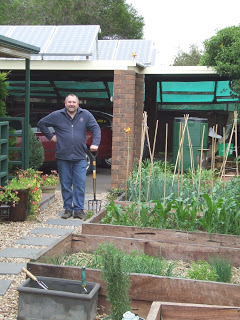
On Labor Day afternoon we had the pleasure of being visited by our local Environment Education Officer, Linda Bradburn and Alan Pears. Alan holds the position of Senior Lecturer in Environment and Planning at the Royal Melbourne Institute of Technology University (RMIT). He teaches such things as;
Officer, Linda Bradburn and Alan Pears. Alan holds the position of Senior Lecturer in Environment and Planning at the Royal Melbourne Institute of Technology University (RMIT). He teaches such things as;
- Energy Policy and Management (including links to urban development, transport, buildings, demand management and renewable energy technologies, and energy market reform)
- Climate change policy and mitigation measures,
- Technology and Environment
Linda contacted us earlier in the week about the visit and we were more than happy to accommodate.
It was a very hot afternoon with the temp around 36-38 degrees C. When they arrived, we got out of the heat in the nice cool house and sat and talked about all things sustainable, from energy efficient air-conditioners to peak oil. After about 30 minutes I took them both on a tour of our house to show them (mainly Alan, as Linda had already had the privilege) the technology we use to reduce our carbon footprint. We looked at the solar panels, the grid connect inverter, the panels again (they do look nice!), and the solar hot-water system.
During the tour, I posed this question. “What do you think will happen to Melton after Peak Oil”. Alan and Linda described a not so nice outcome. I shall paraphrase, “As Melton has 85% of its population working outside of the shire boundaries, its residents will find it very difficult to get to their place of employment as petrol prices rise through the roof. If the public transport system is not expanded to meet the extra capacity of the soon to be non-driving public, then the town would be hit with a huge economic crisis. It would become a slum similar to most suburbs far from the city.” I believe that the citizens of Melton will have two choices, move to the city or country, or stay and rough it out and develop a village in which more food and jobs are sourced locally. Not a rosy picture for the outer areas of major cities. At least the freeways will be clear for me and my Civic Hybrid car!
We continued by looking briefly at the front yard and Linda mentioned that there are some very drought tolerant local flora that look nice and would survive well in the present conditions. I must email the Melton Environment Group to find out where I can get them from.
After the tour we went back inside (cool!) and had a final chat. They both were very impressed with what Kim and I had achieved in such a short space of time. Alan and Linda mentioned that they had travelled from Gisborne which is about 23km away from Melton in the foot hills of the Great Dividing Range. Alan told us that he was kind of mentoring a couple who have started an energy efficiency and home auditing company. It is a good time to start this type of business for two reasons;
- Growing awareness of Climate Change and the willingness of ordinary Australians to take action and,
- The Federal Government promised to provide low interest loans of A$10,000 to make home improvements to lower residential carbon footprints nation wide.
As mentioned previously, two really good reasons to start this type of company. I suppose someone has to facilitate the governments scheme, and it will create many jobs in this growing job sector. About time, I say!
With the visit over, we said our goodbyes. Kim and I agreed that it was good to chat with like minded people who felt the same way we did. A breath of fresh air in an otherwise stagnant part of the world. The parting remark from Alan and Linda was that I should get more active in local politics and should attend some council meetings to get the feel for the political climate. I know just from living here in Melton of the lack of action by our local council regarding environmental matters. Recycling is about the only thing they report on, and they sponsor some local re-vegetation of the so called “green belts” around the shire. There no energy efficient buildings (apart from ours) in the area, no promotion by council about energy efficiency, or any other local awareness schemes of that nature. The only energy producers are a few residential houses with PV, so all of the shires energy needs are imported.
We need action now! If the council do act, the shire can make a name for itself and be a shining example to the rest of the state. It is not hard, look what we have done with a limited budget and a short amount of time. Once there is buy-in by the local public (who are probably waiting for the council to act anyway) there will be a lot of excitement and people willing to assist in creating a better future. As they say “Think Globally, Act Locally!”
Kim and I will be attending the next council meeting, so I will keep you posted on what happens next!
